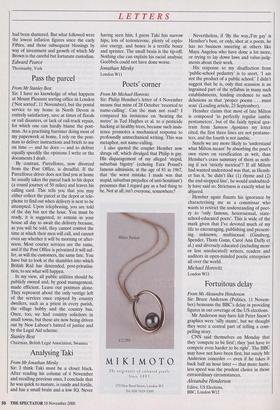Poets' corner
From Mr Michael Horovitz Sir: Philip Hensher's letter of 4 November moans that mine of 28 October 'resorted to name-calling'. Can the man not read? I compared his insistence on 'hearing the metre' in Ted Hughes et al to a pesticide hacking at healthy trees, because such insis- tence promotes a mechanical response to profoundly unmechanical writing. This was metaphor, not name-calling.
I also quoted the couplet Hensher now shrugs off, which divulged that Philip is gay. His disparagement of my alleged 'stupid, suburban bigotry' (echoing Ezra Pound's famous admission, at the age of 81 in 1967, that 'the worst mistake I made was that stupid, suburban prejudice of anti-Semitism') presumes that I regard gay as a bad thing to be. Not at all; isn't everyone, somewhere? Nevertheless, if 'By the way,/I'm gay' is Hensher's best, or only, shot at a poem, he has no business sneering at others like Maya Angelou who have done a lot more, or trying to lay down laws and value-judg- ments about their work.
His response to my disaffection from `public-school pedantry' is to snort, 'I am not the product of a public school.' I didn't suggest that he is, only that scansion is an ingrained part of the syllabus in many such establishments, lending credence to such delusions as that 'proper poems . . . must scan' (Leading article, 23 September).
Hensher claims that most of late Milton is composed 'in perfectly regular iambic pentameters', but of the fairly typical qua- train from Samson Agonistes my letter cited, the first three lines are not pentame- ters, and the fourth is not iambic.
Surely we are more likely to 'understand what Milton meant' by absorbing the poet's own views on versification as writ, than Hensher's crass summary of them as noth- ing if not 'strictly metrical'? If all Milton had wanted understood was that, as Hensh- er has it, 'he didn't like (1) rhyme and (2) the end-stopped line', he would undoubted- ly have said so. Strictness is exactly what he abjured.
Hensher again flaunts his ignorance by characterising me as a commissar who wants to restrict the understanding of poet- ry to 'only famous, heterosexual, state- school-educated poets'. This is wide of the mark given that I've devoted much of my life to encouraging, publishing and present- ing unknown, multisexual (Ginsberg, Spender, Thom Gunn, Carol Ann Duffy et al.) and diversely educated (including more or less uneducated) writers, readers and auditors in open-minded poetic enterprises all over the world.
Michael Horovitz
London W11


































































































 Previous page
Previous page